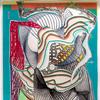Harvard Students' Installation in the Sackler Museum Names Opioid Victims
- December 09, 2019 19:52
A new art installation at Harvard University's Arthur M. Sackler Museum names local victims and survivors of opioid abuse, taking aim at the family legacy of the benefactor whose name the museum bears and the addictive drug that ballooned the Sackler multibillion dollar fortune while contributing to a national epidemic linked to tens of thousands of deaths each year.
Three students in the History of Art and Architecture department — Kaitlin Hao ’21, Wendy Yu ’21 and Samantha J. Meade ’21 — conceived of the project, called “Remember Their Names,” that lines steps with the names of those affected by opioid addiction. The students plan to fund a marble memorial plaque for victims in the lobby of the museum.
“‘Remember Their Names’ hopes to disrupt the overwhelming presence of the Sackler family within the building and invites the voices and perspectives of the people the Sacklers harmed the most,” according to the artists’ statement.
Harvard University President Lawrence S. Bacow has dismissed repeated calls for the Sackler name to be removed from the museum, or for a return of funding, telling The Harvard Crimson that such a move would be "inappropriate."
As public opinion sours on unseemly funding sources at museums and lawsuits pile up against some members of the Sackler family and its company, the OxyContin maker Purdue Pharma, many other museums and institutions have scrubbed the Sackler name and refused funding.
Last Thursday, Tufts University became the first university to delete the Sackler name from its campus, including five buildings and programs.
The Guggenheim, the Metropolitan Museum of Art, the American Museum of Natural History, Britain's National Portrait Gallery, and the Tate are among the museums that have stated that they will no longer accept Sackler donations.
Arthur M. Sackler's widow, Jillian, has protested the reprisals, noting that he died before OxyContin was made. “The man has been dead for 32 years. He did not profit from [OxyContin], and none of his philanthropic gifts were in any way connected to opioids or to deceptive medical marketing. ...It deeply saddens me to witness Arthur being blamed,” she said in a statement to the New York Times. Protestors have pointed out Arthur Sackler's legacy of aggressive drug marketing as a strategy passed to family members who profited from OxyContin.
“These are some of the biggest dealers in America," said photographer Nan Goldin to wbur, referring to the role that various Sacklers played in OxyContin sales. Goldin, who struggled with her own painkiller addiction after a minor surgery, and her pressure group 'PAIN,' have staged many high-profile protests at museums to bring light the ethical issues involved with Sackler donations; it's worked.
Over $35 billion worth of OxyContin has been sold by Purdue to date, with over $4 billion in profit distributed to the Sacklers since 2007, reports Forbes. Purdue Pharma filed for Chapter 11 in September as part of settlement with 24 states and 2,000 small government plaintiffs.





















